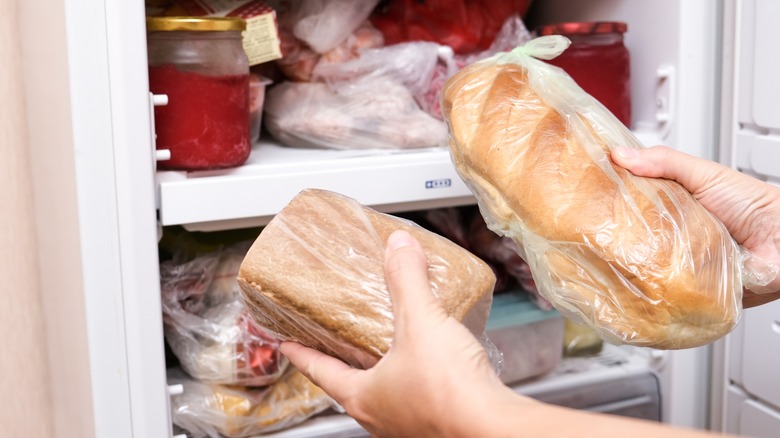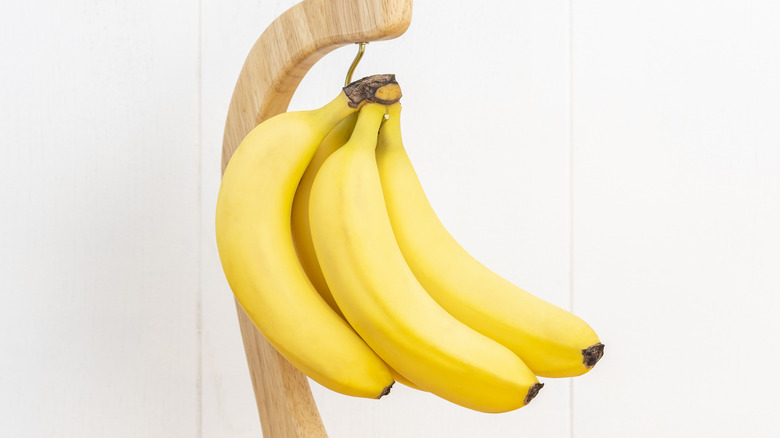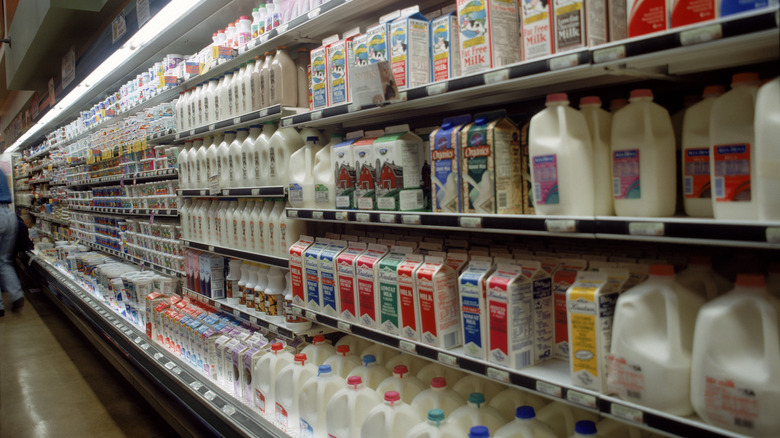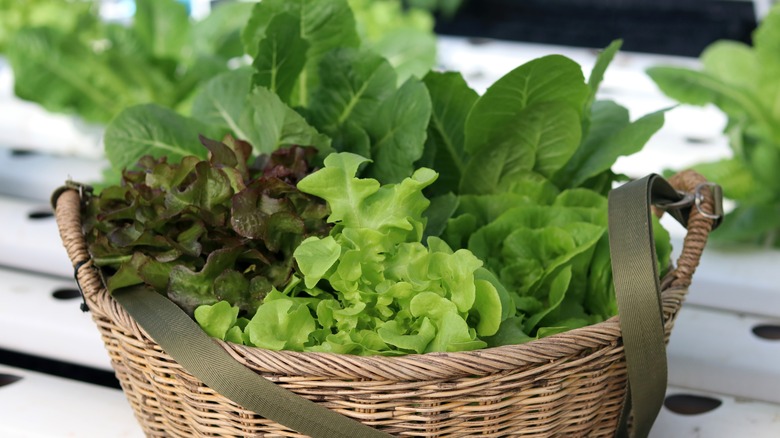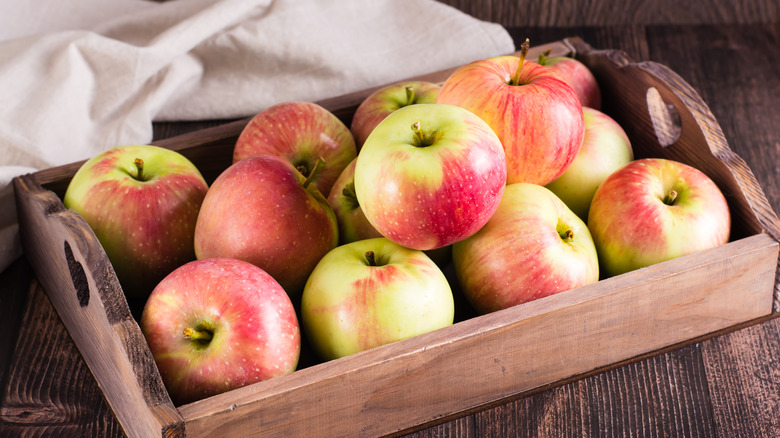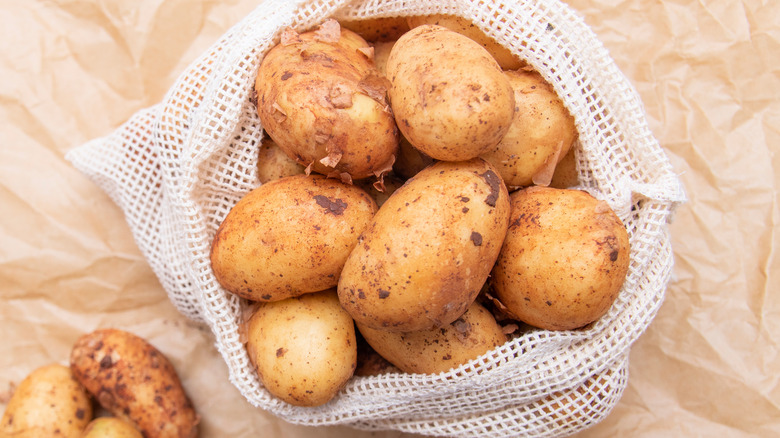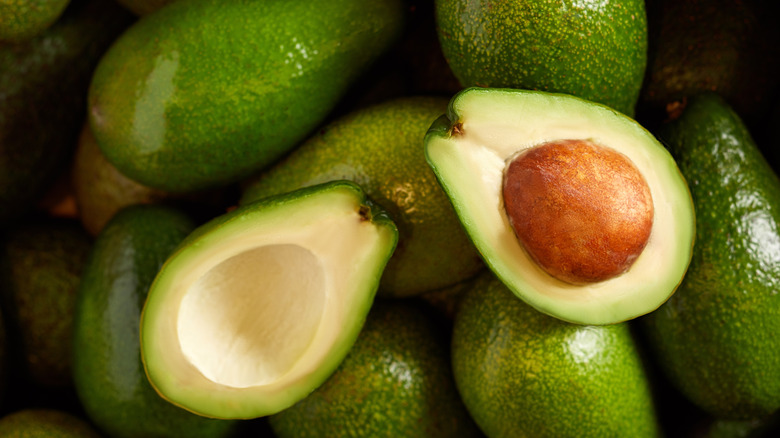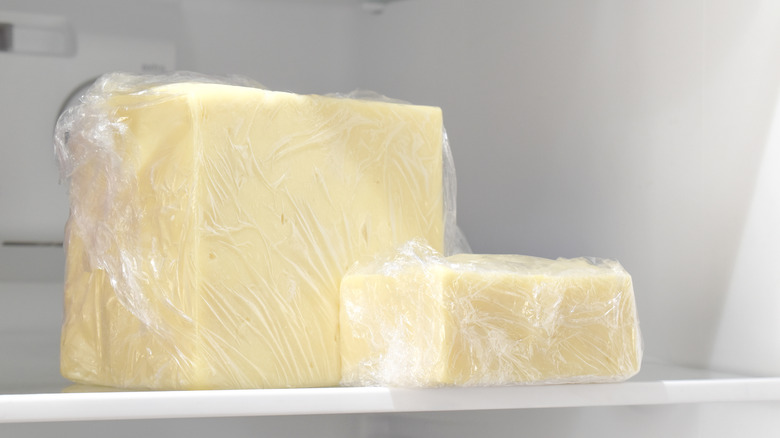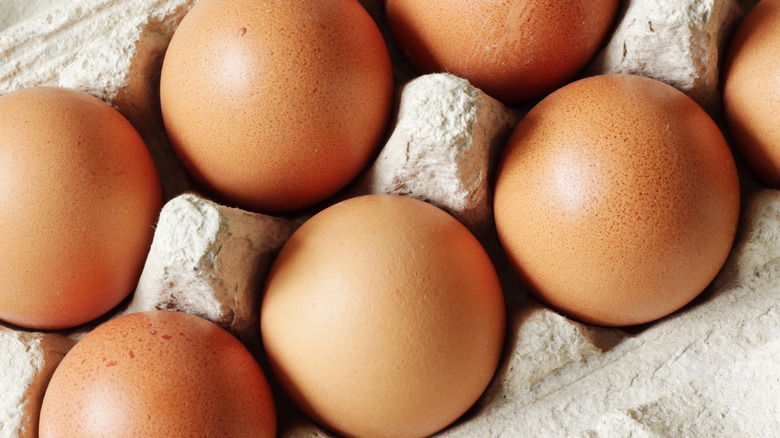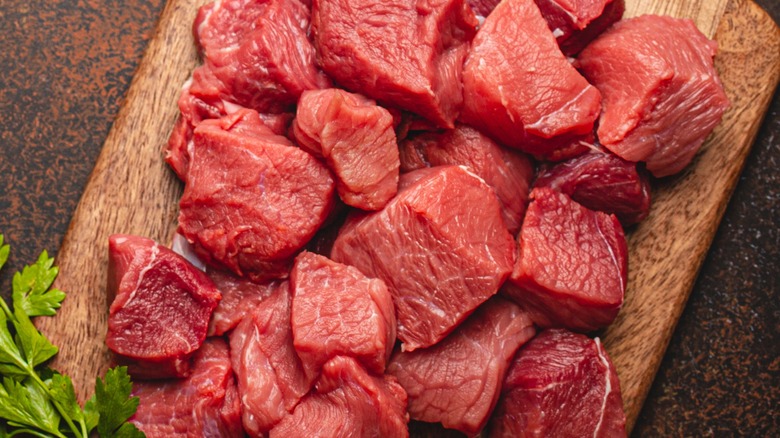The Most Commonly Wasted Grocery Items And How To Make Them Last Longer
The United States is the biggest food waster in the world, discarding close to 60 million tons of food each year. Shockingly, this accounts for 40% of the country's entire food supply. Even more shocking is the fact that while many of us are discarding edibles, around 35 million Americans — including children — are experiencing food insecurity.
Among the various culprits of food waste are certain grocery items that tend to be misunderstood and improperly stored, leading to premature spoilage. Luckily, by taking strategies to make these items last longer, we can reduce waste and promote a more sustainable approach to our food consumption. Learning how to make common grocery items last longer can also save us a lot on our supermarket bills.
Whether you're looking to stock up during sales or are tired of discarding spoiled or expired items, here are a few simple tips to maximize the longevity of the most commonly wasted grocery items. With these practical strategies, you'll not only extend the shelf life of your products but also save money.
Bread
The unavoidable truth is that stale bread sandwiches just don't hold the same appeal as ones made with fresh, crusty rolls. Nevertheless, it's disheartening to learn that 240 million slices of bread are wasted each year in the U.S. alone. Luckily, by taking a few simple storage steps, you can prolong the shelf life of your bread, ensuring that it stays fresh as long as possible.
When storing bread at room temperature, avoid plastic bags because they can trap moisture and lead to premature mold. Instead, place your baked goods in paper bags or wrap them in a cotton cloth — the breathable nature of these materials will keep the bread moist without drying it out for up to four days. Alternatively, you can store baked goods in a bread box, which has been specifically designed to promote optimal airflow.
While generally not recommended, if you have to refrigerate your bread, place it in a plastic bag to prevent it from drying out. And while bread can be stored in the fridge for up to two weeks, it's likely to gradually turn stale. If you've purchased more bread than you can handle, your best bet is cutting it into slices, placing it in plastic, and freezing it while it's still fresh. By doing this, you can defrost only what you need and save the rest for later. As a rule of thumb, bread can be kept in the freezer for up to three months.
Bananas
Bananas come in a variety of colors, depending on their degree of ripeness — they start out green and transition to yellow as they ripen. As bananas age, they acquire brown spots, gradually soften, and eventually turn entirely brown and start releasing liquid. While different people like their bananas at different levels of ripeness, once the fruit becomes slimy, it's no longer suitable for consumption.
To slow down the ripening process, keep bananas away from fruits like avocados, apples, pears, and peaches since they release ethylene, an agent that increases the ripening process. Ideally, store bananas at around 54 degrees (this is somewhere between room and refrigerator temperature) and hang them from a hook to prevent any bruising. To decelerate the ripening process, some may state that you should wrap the stems of bananas in plastic or foil, as they also emit ethylene gas. However, there's actually no evidence to support that this works.
Once sufficiently ripe, place the bananas in the refrigerator to stop them from ripening any further. Bananas can also be frozen although it's best to peel and slice them before placing them in the freezer to simplify the thawing process. To stop the slices from sticking together, it's best to freeze them on a tray and then transfer them to an airtight container. Alternatively, you can make banana purée and freeze it in ice cubes. Bananas can stay in the freezer for up to six weeks.
Milk
Around 5.9 million glasses of milk, which accounts for close to 20% of all milk produced, go to waste in the U.S. each year, as reported by Earth.org. Fortunately, there is some useful information about milk's shelf life that might help address this issue. If properly stored, milk can last around a week beyond the "best by" date on the carton. This being said, you should never drink milk if it becomes discolored, lumpy, or smelly.
To make sure that your milk goes the distance, keep it in its original container at the back of the refrigerator. Try to avoid storing milk in the refrigerator door, as the frequent temperature changes as you open and close it can negatively impact the product's shelf life. While it's also possible to freeze milk for up to three months, this isn't recommended as it can change its color and texture. Nevertheless, if you don't mind slightly yellow and grainy milk, it can be a great alternative for extended storage. If you find the texture undesirable, you can try shaking the milk or mixing it using a blender to improve its consistency. To prevent milk from spoiling, it's important to always defrost it in the refrigerator. Depending on the amount of milk being thawed, this process can take up to 24 hours.
Lettuce
Like other fruit and vegetables, lettuce doesn't normally come with a use-by date. As such, determining how long it's going to stay fresh isn't an exact science. As a rule of thumb, however, when stored appropriately, iceberg and romaine lettuce can be kept for up to 10 days, loose-leaf lettuce for up to 7 days, and butter lettuce for up to 5 days. Just to be on the safe side, keep an eye out for any leaf discoloration and slimy texture.
To keep lettuce heads fresh and crisp as long as possible, wrap them in plastic and store them in the crisper drawer of the refrigerator. Loose lettuce leaves should be rinsed and dried before being placed in the fridge to prevent them from going slimy. This can be easily done with a paper towel or a salad spinner. Once dry, wrap the leaves in a paper towel and place them in a sealable plastic bag or a container before popping them in the fridge.
Lama from Taste Great Foodie suggests a simple hack she says will keep your lettuce fresh for up to a month. Her recommendation is to refrigerate the leafy vegetable in a mason jar filled with water. Lama advises changing the water every few days for optimal results — although she does admit to stretching this period of time to 10 days.
Apples
The classic saying, "an apple a day keeps the doctor away," holds true provided that your apple doesn't become a victim of spoilage due to poor storage. Since apples ripen between six and 10n times faster out of the refrigerator, be sure to only keep them on your countertop if you're planning to eat them within a couple of days. In addition, only wash your apples once you're ready to eat them so as not to strip the wax that protects them from fungi and drying out.
Avoid storing apples in paper bags, as this can trap the ethylene gas they emit, leading to accelerated ripening. This can also adversely affect other apples stored alongside them in the same bag. It's also why it pays to remove any bruised or damaged apples, so they don't speed up the ripening process of their neighbors. One bad apple really does spoil the lot.
To keep your produce crunchy for up to six weeks, place unwashed apples in a plastic bag with air holes in the crisper drawer of the refrigerator. Alternatively, store them under a damp towel to prevent them from drying out. If you want to preserve peeled or sliced apples, you can delay browning by refrigerating them in a bowl of cold water mixed with a tablespoon of lemon juice.
Potatoes
Each year, Americans throw away a staggering 5.8 million potatoes, a statistic that may not be surprising considering the common practice of purchasing spuds in bulk. Given that the storage environment significantly influences the longevity of tubers, it makes sense to take a few measures to postpone their deterioration and enjoy them before they become shriveled and soft.
Storing raw potatoes in dark environments between 43 and 50 degrees delays sprouting and stops potato skins from producing chlorophyll and turning green. In fact, spuds stored in cool areas such as basements, cellars, and garages usually stay fresh for months. It's also a good idea to keep potatoes in paper bags or cardboard boxes to keep out light — never store tubers in plastic bags since this inhibits airflow.
Finally, raw spuds shouldn't be refrigerated or frozen since low temperatures convert potato starch into sugar, altering the product's taste and texture. Equally important is keeping potatoes separate from onions during storage. This is because both vegetables emit moisture and ethylene gas, which can accelerate ripening and spoilage. It also pays to keep an eye on your potato inventory and remove any spuds that have sprouted or turned wrinkly. This will prevent the spread of spoilage and preserve the overall freshness of the remaining potatoes.
Avocados
It's best to store avocados at room temperature until they turn ripe. As a rule of thumb, a ripe avocado should be dark green in color and yield to gentle pressure while maintaining its shape. It should also have relatively smooth skin, without any visible bruises or soft spots. When sliced open, a ripe avocado should be green with minimal discoloration.
Once ripe, transfer avocados to the produce drawer of the refrigerator to delay the ripening process and to keep them from going bad. This should ensure that the creamy fruits stay good for around two weeks. Avocados tend to oxidize — or go brown — shortly after they are cut open. While this isn't a problem in terms of taste, some people find it visually unappealing. If you want to save some of your avocados for later after cutting into them, leave the seed in place and cover any exposed flash with plastic wrap before placing the fruit in the refrigerator. Alternatively, store the avocado with onion, as this delays the browning process.
If in a bind, you can also freeze avocados. However, since this is likely to affect their texture, it's best to use thawed avocados only for mashing, blending, or puréeing. If you're freezing half a fruit, brush the exposed area with lemon or lime juice to prevent browning. Conversely, if you plan to mash the avocados before freezing, it's best to mix them with a small amount of lemon or lime juice. For best results, freeze avocados in airtight ziplock bags.
Cheese
The shelf life of cheese can vary depending on its type and how it's stored. Hard cheeses, such as cheddar and parmesan, can generally be stored for longer periods compared to soft cheeses. Once unpackaged, hard cheeses last for up to a month and soft cheeses for around a week, with the exception of cream cheese, which can be consumed for up to two weeks (via Healthline).
It's advisable to get into the habit of inspecting cheese prior to consumption. If you notice any moldy spots on hard cheese, the USDA recommends cutting one inch around the affected area before eating the product. When it comes to soft cheese, however, mold is usually a sign that the entire product needs to be discarded for safety reasons.
There are several measures that can be taken to extend the shelf life of cheese. When refrigerating cheese, it's important to ensure that the fridge is set below 40 degrees. Additionally, to prevent the cheese from drying out, it's advisable to store it in plastic wrap. For hard cheeses, it is a good idea to first wrap them in parchment or wax paper before wrapping them in plastic. On the other hand, soft and semi-soft cheeses should be placed in airtight containers to minimize exposure to air and odors from other foods.
Eggs
Provided that they are stored correctly, raw eggs in shells can be refrigerated for up to five weeks past the date they were washed and packaged. To find the pack date(also called the Julian date), look for a three-digit number between 001 and 365 (the consecutive days of the year) on the egg carton. It's best to store eggs in shells since their shelf life decreases drastically once cooked or cracked.
Hard-boiled eggs in shells are good for up to one week but, once peeled, should be eaten the same day. Raw egg yolks can be safely stored for up to two days while raw egg whites can be kept for up to four days. Freezing raw eggs in shells is not recommended due to expansion and breakage, but you can freeze them out of their shells in freezer-safe containers for up to a year.
To make the most out of your eggs, always store them in their original carton rather than the plastic egg containers on the refrigerator door. This ensures that they are kept at a constant temperature. In addition, keeping eggs pointy side down in the carton can help prolong their freshness. This positioning utilizes the air bubble in the rounder side of each egg to keep the yolk centered, resulting in longer-lasting eggs. Unlike raw eggs in shells, hard-boiled eggs are best stored in airtight containers. Once peeled, you can also place them in a jar of water to stop them from drying out.
Meat
When it comes to ground meat and poultry, it's best to keep it refrigerated no longer than two days before either cooking or freezing. Most other raw meat, such as beef, lamb, veal, and pork, can be stored in the refrigerator for up to five days. Once you've cooked the meat, you've got about four days to store it in the refrigerator before it goes bad. If you want to ensure that your meat stays in top shape after getting it home, remove it from the store packaging, pat it dry, and transfer it to a container before refrigerating.
While meat has a relatively short shelf life, freezing your protein can keep it fresh and tasty for longer periods of time. This being said, it's generally recommended to use frozen meat within one to 12 months, depending on the type. One of the most important things to remember is to store meat in wax or freezer paper or airtight containers to help prevent freezer burn, or discoloration and dryness that can occur when meat is exposed to air. Finally, don't forget to label and date your meat packages to keep track of the duration of their storage.
Carrots
Carrots typically maintain their freshness for approximately five weeks, but once they are cooked, their shelf life reduces to about one week. Meanwhile, baby carrots last for up to a month. However, it's worth noting that the exact lifespan of carrots can vary, so it's always wise to inspect your carrot stash periodically to ensure the quality and freshness of your produce. As a general rule, you can tell that carrots are on the way out if they develop small white spots (you can still eat them but probably should do so in the next day or so). However, once your carrots turn mushy or slimy, it's game over.
To make the most out of your carrots, refrigerate them unpeeled in perforated plastic bags. Before placing them in storage, however, be sure to remove the leafy green tops, as they tend to draw out moisture and make the carrots wilt faster. Another option for extending the crispness of carrots is to store them in containers filled with filtered water. In addition, avoid storing carrots near ethylene-producing fruits and vegetables, as this can accelerate spoilage. If you've overstocked, you can also freeze carrots for up to eight months, provided that you blanch them first.
Deli meat
Deli meat, also known as luncheon meat or cold cuts, is pre-cooked or cured meat that's commonly used in sandwiches or salads. It includes a variety of meats such as turkey, ham, roast beef, chicken, and salami. Once removed from the packaging, deli meat can be refrigerated for up to five days or frozen for up to two months. When it comes to gauging whether your deli meat has reached its use-by date, it's best to trust your senses. If the meat is discolored, slimy, and smelly, it's a pretty safe bet that eating it may make you worse for wear.
If you find yourself with a large quantity of deli meat, it's probably best to bite the bullet and freeze it for later use as there's no real way to trick meat into lasting longer. Begin by separating the meat slices with parchment paper or wax paper to prevent them from sticking together. Once ready, place the separated slices in a trusty freezer-safe bag, squeezing out any excess air. Don't forget to jot down the freezing date on the bag so you can keep tabs on the product's storage time. When ready to use, thaw the deli meat in the refrigerator and eat it within a few days.

